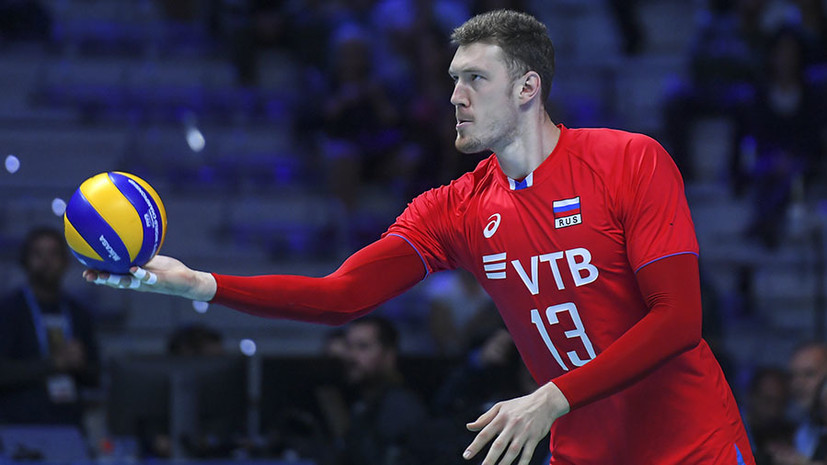Last day, a doping scandal, unusual for this sport, began to unfold in Russian volleyball. The International Volleyball Federation (FIVB) announced the nine-month disqualification of the 2012 Olympic champion Dmitry Musersky. He was punished for a positive doping test, which he passed more than eight years ago. It was discovered after the World Anti-Doping Agency (WADA) transferred the data of the Moscow laboratory to the FIVB.
In this case, it is not so much the fact that the athlete has taken a prohibited drug that is ambiguous, but the circumstances under which it became known. Mussersky's doping test was dated May 11, 2013 and was taken after the match of the Russian Volleyball Championship in Belgorod, where the central blocker was playing for Belogorye at that time. It was the end of the season, as a result of which the club won both the national championship and the Cup of the country.
Soon, analysis showed the presence of the forbidden substance methylhexanamine, or geranium extract, in it. However, the course of this case was never given. The fact of a positive doping test was hidden by the Moscow laboratory, which at that time was headed by Grigory Rodchenkov. Musersky then escaped punishment, but at the same time he lost the opportunity to understand the matter and try to defend his honor. Methylhexanamine is notorious in the anti-doping industry as it is often found in contaminated legal drugs and even in food. The volleyball player had a chance to quickly figure out what had happened.
The forgery came to light after WADA obtained the database of the Moscow laboratory and the ability to double-check many old doping samples. The agency has passed information on suspicious cases to international federations, so that then they themselves initiate proceedings and, over time, impose sanctions.
The results of one of these cases have now been reported by the FIVB. The federation entered into an agreement with WADA and Musersky, in which the athlete recognized the presence of methylhexanamine in his doping test. In accordance with the FIVB anti-doping rules in force in 2013, the volleyball player was suspended for nine months. The report has been under way since April 5, 2021, so in two and a half months Musersky will return to sports. The FIVB separately emphasized that the sanctions against the athlete do not in any way relate to the results of the Russian men's volleyball team, for which the blocker played a lot in the summer of 2013.
Musersky himself also told the details of this unpleasant story. According to him, the notification of a positive doping test came to him in June this year. At that moment, he was recovering from an injury sustained during the League of Nations. The athlete himself emphasized that the damage really happened.
“A doping test taken by the Russian Anti-Doping Agency (RUSADA) at the end of the 2013 Russian Championship gave a positive result. But then it was hidden from me and from WADA. I don't understand why, because then the maximum disqualification would be only three months. As a result of the conflict between RUSADA and WADA, the data got to WADA, and, probably, the result of a positive doping test was found there. I don't know all the details. But WADA said that the data they received did not require any proof. One way or another, in 2021, I must be responsible for the fact that in 2013 an accident occurred, and the result was concealed. It seems to me that this is extremely dishonest. Now I have less indignation than in the summer, but I consider this whole situation unfair in relation to myself, ”Musersky told Sport-Express.
The athlete also drew attention to the fact that his next doping tests were clean.
He also said that at that time he was taking a drug from an American pharmaceutical company, which WADA recognized as contaminated two years later.
We are talking about the company USPlabs, which forged the certificates of its products and misinformed consumers about the composition of dietary supplements.
The fact that methylhexanamine entered the body of Musersky by accident is also indicated by its concentration in the doping test.
But now these arguments are irrelevant.
The All-Russian Volleyball Federation (VFV) supported the athlete and expressed confidence that doping had entered his body by accident.
The organization also said that in November, before the expiration of the period of ineligibility, Musersky will be able to freely start training.
“After eight years have passed since the alleged events, it is no longer possible to accurately establish all the circumstances of what happened, especially given the fact that it is not possible to analyze the athlete's control sample“ B ”.
This event was a big surprise for both the WWF and the athlete.
In this regard, we are convinced that Mussersky would never knowingly use prohibited substances.
Throughout the disciplinary investigation, we were in constant contact with the FIVB and the athlete, and at the time of the official charge of anti-doping rule violation in June 2021, the athlete made a decision on voluntary suspension pending the final decision of the FIVB, ”the VFV stressed.

